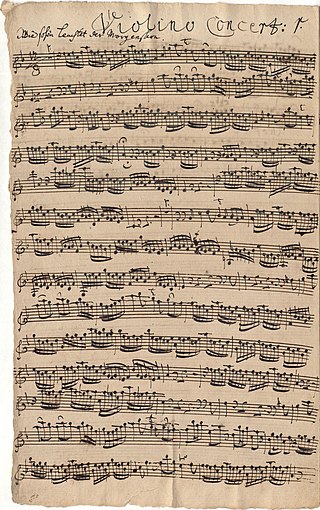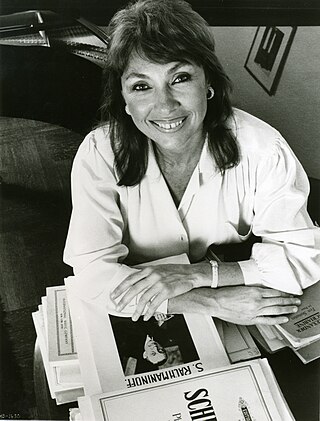Related Research Articles
Karl Richter was a German conductor, choirmaster, organist, and harpsichordist.

Jacques Loussier was a French pianist and composer. He arranged jazz interpretations of many of the works of Johann Sebastian Bach, such as the Goldberg Variations. The Jacques Loussier Trio, founded in 1959, played more than 3,000 concerts and sold more than 7 million recordings—mostly in the Bach series. Loussier composed film scores and a number of classical pieces, including a Mass, a ballet, and violin concertos. His style is described as third stream, a synthesis of jazz and classical music, with an emphasis on improvisation.

Josef Gingold was a Russian and American classical violinist and teacher who lived most of his life in the United States. At the time of his death he was considered one of the most influential violin masters in the United States, with many successful students.

Gottfried Heinrich Stölzel was a German composer of the Baroque era.

Wie schön leuchtet der Morgenstern, BWV 1, is a church cantata for Annunciation by Johann Sebastian Bach. In 1725, when the cantata was composed, the feast of the Annunciation coincided with Palm Sunday. Based on Philipp Nicolai's hymn "Wie schön leuchtet der Morgenstern" (1599), it is one of Bach's chorale cantatas. Bach composed it in his second year as Thomaskantor in Leipzig, where the Marian feast was the only occasion during Lent when music of this kind was permitted. The theme of the hymn suits both the Annunciation and Palm Sunday occasions, in a spirit of longing expectation of an arrival. As usual for Bach's chorale cantata cycle, the hymn was paraphrased by a contemporary poet who retained the hymn's first and last stanzas unchanged, but transformed the themes of the inner stanzas into a sequence of alternating recitatives and arias.
The English Concert is a baroque orchestra playing on period instruments based in London. Founded in 1972 and directed from the harpsichord by Trevor Pinnock for 30 years, it is now directed by harpsichordist Harry Bicket. Nadja Zwiener has been orchestra leader (concertmaster) since September 2007.

Ruth Laredo was an American classical pianist.

In 1724 Johann Sebastian Bach composed the church cantata Meine Seel erhebt den Herren, BWV 10, as part of his second cantata cycle. Taken from Martin Luther's German translation of the Magnificat canticle, the title translates as "My soul magnifies the Lord". Also known as Bach's German Magnificat, the work follows his chorale cantata format.
Lillian Fuchs was an American violist, teacher and composer. She is considered to be among the finest instrumentalists of her time. She came from a musical family, and her brothers, Joseph Fuchs, a violinist, and Harry Fuchs, a cellist, performed with her on various recordings.

Was mir behagt, ist nur die muntre Jagd, BWV 208.1, BWV 208, also known as the Hunting Cantata, is a secular cantata composed by Johann Sebastian Bach, belatedly for the birthday of Duke Christian of Saxe-Weissenfels on 27 February 1713. A performance lasts about forty minutes. The aria "Schafe können sicher weiden" is the most familiar part of this cantata.
The Alma Trio was a classical piano trio established in 1942 at the Alma Estate of Yehudi Menuhin in Los Gatos, California.

Nathan "Tossy" Spivakovsky, a Jewish, Russian Empire-born, German-trained violin virtuoso, was considered one of the greatest violinists of the 20th century.
Jean Pougnet was a Mauritian-born concert violinist and orchestra leader, of British nationality, who was highly regarded in both the lighter and more serious classical repertoire during the first half of the twentieth century. He was leader of the London Philharmonic Orchestra from 1942 to 1945.
Robert McBride was an American composer and instrumentalist.

Henri Temianka was a virtuoso violinist, conductor, author and music educator.

Rudolf Borisovich Barshai was a Soviet and Russian conductor and violist.

The Bach Aria Group is an ensemble of vocal and instrumental musicians that was created in 1946 by William H. Scheide in New York City to perform the works of J. S. Bach.

Schlage doch, gewünschte Stunde, BWV 53, is an aria for alto, bells, strings and continuo. It was likely composed in the early 18th century, although its date of first performance is unknown. From the second half of the 18th century until the early 1950s the aria was attributed to Johann Sebastian Bach. In 1955, it was suggested by the Bach scholar Karl Anton that the aria's composer was more likely to be a member of Melchior Hoffmann's circle.
Robert Bloom was an oboist with an orchestral and solo career, a composer and arranger contributing to the oboe repertory, and a teacher of several successful oboists. Bloom is considered seminal in the development of an American school of oboe playing.
Sonya Monosoff is a violinist, a pioneer of the Baroque violin and one of the first American performers to use the Baroque violin in performance.
References
Online database
Selected discography
- Recordings of Bach Cantatas & Other Vocal Works
- Cantata BWV 68: Also hat Gott die Welt geliebt
- The Art of Robert Bloom, Vol. One
- The Art of Robert Bloom, Vol. One and Two
- The 20th Century Concert Hall, Vol.2, CBS Radio Orchestra with Maurice Wilk, violin and Julius Baker, flute - February 7, 1954; LP recording
- CD-1187(12) Casals Festival at Prades with Maurice Wilk, violin, Vol 2, CD 1
- A complete listing of recordings with violinist Maurice Wilk in LP format, are listed on the Alma Trio page. These recordings of works by Beethoven, Brahms, and Schubert, are cataloged by the Library of Congress.